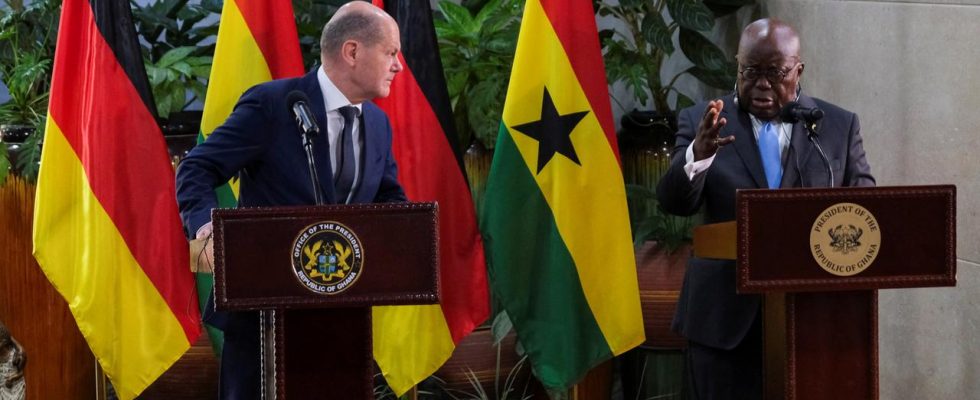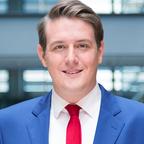Chancellor Scholz spent three days in West Africa – the region is important as an energy supplier, but also for curbing irregular migration. Back in Berlin, Scholz now has a lot of impressions in his luggage – but little of it is concrete.
The journey in the morning is difficult. It has started to rain. The unpaved road into the mountains outside Accra is muddy and full of puddles. The Chancellor’s column is progressing more slowly than planned: The Chancellor will not arrive at the renowned Ashesi University on time. The students don’t mind. They wait for Scholz with almost German discipline. The appointment is very important to him. That’s why he’s in the program before the meeting with Ghana’s President Akufo-Affo. The Chancellor wants to listen to what young people think about their country, its prospects and Germany. But what Scholz initially hears is not positive. The students strongly criticize the Chancellor. “We don’t need a Western savior,” student Valerie Akon explains to him.
Chancellor Scholz and Ghanaian students: “We don’t need a savior from the West.”
The potential is there, but…
One thing quickly becomes clear: young people do not lack self-confidence. After all, you are part of the elite here. “There are certainly a lot of problems here, but that’s just one side of the coin – our continent has a lot of potential that needs to be raised and promoted,” says Valerie.
At least there it hits the nerve of the Chancellor. Potential that needs to be raised and promoted is entirely in Scholz’s spirit, which is why he flew to Ghana and also Nigeria. On the one hand, there is the energy potential. In Nigeria, Scholz is trying hard to ensure that the power grid is expanded with the help of German companies. However, the exit is open. Scholz also wants Nigeria to invest in a new LNG terminal. The idea behind it: If Nigeria becomes relevant as a supplier for Germany, the higher supply will reduce gas prices on the world market.
But the hoped-for gas deliveries will probably not be possible overnight. But the Chancellor’s promotional tour for “Made in Germany for Africa” does not just extend to energy. “The story I would like to offer you is one where German and Nigerian potentials merge, a story of growth for mutual benefit, clean energy and legal migration,” says Scholz.
Polite stalling
The Chancellor is trying to put a positive spin on the migration issue in Africa, especially in Nigeria with its 220 million people. Irregular immigration to Germany should be limited – not many Nigerians are recognized in Germany anyway. Legal immigration, on the other hand, should be encouraged. “Yes,” says Scholz to the Nigerian president, “we need talented people in Germany who want to work here and who have come here regularly.”
The President listens patiently to the whole thing. But here too, Olaf Scholz does not receive any firm assurances that Nigeria will take back asylum seekers who have been rejected in Germany. Just this: we are prepared to work together in this direction.
Actually, that’s not enough. There are currently almost 13,800 Nigerian citizens in Germany who are required to leave the country. The problem: around 12,500 of them are tolerated. The most common reason: missing papers. This is where Nigeria comes into play. Germany would like more cooperation in establishing identity. For example, a permanent official in charge at the embassy in Berlin. But so far Nigeria has been very cautious.
Waiting for Brussels
This is probably one of the reasons why, according to the Federal Ministry of the Interior, only 262 people were able to be deported to Nigeria this year. Part of the solution could be a bilateral migration agreement between Germany and Nigeria. Fixed quotas for legal skilled migration could be agreed with the West African country. Because Nigeria is interested in people being able to come to Germany. On the one hand, the domestic labor market lacks the momentum to fully employ the rapidly growing population. On the other hand, remittances from Nigerians abroad are an important source of foreign exchange for the country.
A migration agreement could therefore be interesting for both sides. But diplomatic reasons are currently preventing concrete negotiations. This is due to the negotiations at EU level. The agreement between Nigeria and the European Union is likely to be close to completion. The federal government does not want to intervene, but rather wait for the outcome of the negotiations. But it is already clear that a separate agreement is needed. The EU cannot decide on entry quotas.
Less money for voluntary returnees
That’s why Scholz is initially focusing on other tools. For example, voluntary return. On Monday, the Chancellor visited the Center for Migration, Jobs and Re-integration in the Nigerian mega-metropolis of Lagos. We are working on this on a small scale here. Nigerians who saw no future in Germany or were deported are trained here. About 4,000 have returned in recent years. Here they learn to work as hairdressers, fashion designers and shoemakers. Since April, the center has also been increasing its efforts to recruit Nigerians for Germany. Legal. The center is supported by the Ministry of Development, among others. However, the funds have just been cut by almost half. Hard times.
So the two main issues of economy and migration are making slow progress, but there is also the issue of security on the African continent. To do this, Scholz visits the United Nations Kofi Annan Peacekeeping Center in Ghana. The UN isn’t exactly writing many success stories at the moment. The UN mission in Mali MINUSMA is over at the end of the year, and the coup virus is rampant in West Africa. Nigeria and Ghana are still considered relatively stable democracies, which is why Scholz has identified both countries as travel destinations and cooperation partners. At eye level. With respect. Prospects of success: still open.
Pitfalls everywhere
Scholz moves cautiously on this journey, almost tentatively. He doesn’t want to alienate anyone and still enforce his interests, the interests of the federal government; it’s a tough process. Even the peacekeeping center in Accra is not without its pitfalls. The red carpet there leads directly to a “Schröder Hall”, which is actually named after Olaf Scholz’s predecessor in office. The current Chancellor bears it with composure.
Relic from another time: The “Schroeder Hall” in Accra.
It’s a big challenge that Scholz is drilling with his Africa initiatives. And success is not guaranteed. This is made very clear to Scholz at the Ashesi Elite University in Ghana. A student reports. Her name is Kerry, she tells Scholz: “I speak German, but it’s not like very advanced.” Then she immediately switches to English. The Chancellor encourages her, saying German “sounds very good.”
That could also be the headline over the Chancellor’s Africa intentions.


